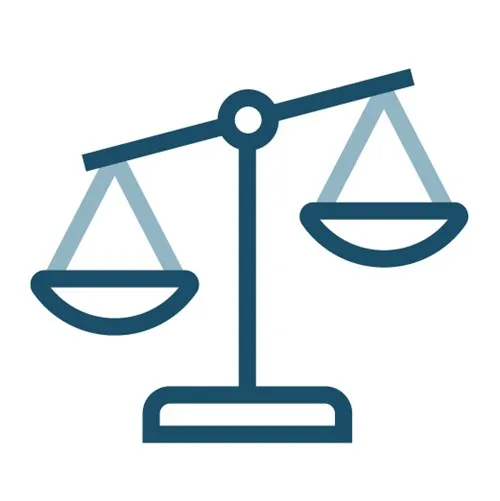Protected Trust Deeds in Scotland
Scroll to learn more

How could a trust deed help you?
If it’s unlikely you could repay all your debts, a trust deed allows you to repay what you can over a fixed period (normally 4 years). Your monthly payment is based on what you can genuinely afford to pay. If you own any assets, the Cleanslate team will let you know if these are likely to be affected. Once you have successfully completed your trust deed, the remaining balance on your debts is written off.
We will contact your creditors on your behalf to make them aware you have signed a trust deed. One of the many advantages of this solution is that, once approved, you will gain legal protection from creditor action.
If you would like to understand how a trust deed could work for you, our friendly advisers are here to help. When you contact us, we will take you through a simple budget to gain a full picture of your financial situation. We will then work with you to agree how much you can realistically afford to pay towards your debts and advise on the best route forward.
Advantages & Disadvantages of a Trust Deed
What are the advantages of a trust deed?
There are many advantages of a trust deed, a few of which are:
- You can stop making separate payments to all your unsecured creditors and instead make one, affordable, monthly payment to your trust deed.
- You will only pay back what you can afford.
- We will deal with creditors on your behalf.
- Your creditors cannot take any action against you to recover the debts once they have agreed to the trust deed and it has gained “protected status”.
- Your remaining debt will be written off upon successful conclusion of your trust deed.
- You may be able to remain as the director of a limited Company
Advantages & Disadvantages of a Trust Deed
What are the advantages of a trust deed?
There are many advantages of a trust deed, a few of which are:
- You can stop making separate payments to all your unsecured creditors and instead make one, affordable, monthly payment to your trust deed.
- You will only pay back what you can afford.
- We will deal with creditors on your behalf.
- Your creditors cannot take any action against you to recover the debts once they have agreed to the trust deed and it has gained “protected status”.
- Your remaining debt will be written off upon successful conclusion of your trust deed.
- You may be able to remain as the director of a limited Company
What are the disadvantages of a trust deed?
- Your trust deed will be visible on your credit file for six years. This may impact your ability to obtain credit for a period after you have been discharged from the trust deed.
- If you own your home, we will need to discuss and agree with you at the beginning how we can deal with this. Your home may be affected in a trust deed, however this is only usually likely if you have a significant amount of equity. We find people often overestimate how much equity there is in their home, meaning they wrongfully assume a trust deed won’t be for them. In some circumstances, it may be possible to exclude your property from a trust deed, however this requires the consent of your creditors and we will discuss with you whether this may be an option for you in your specific circumstances.
- You will be required to pay your full disposable income in a trust deed for a period which is usually at least 48 months. If your circumstances change, you must keep your Trustee informed. This means your contribution payment may increase if your circumstances improve. However, rest assured you will only ever be asked to pay what you can afford.
- If you fail to adhere to the terms of the agreement, the Trustee may choose to terminate the trust deed. This would mean your creditors could then take action to recover the money owed to them. Any payments made to your trust deed will not be refunded and will be used to meet the Trustee’s fees and, where possible, payment to your creditors.
Frequently asked questions
What is the Debt Arrangement Scheme?
The Debt Arrangement Scheme (DAS) has been put in place by the Scottish Government. It allows people who are able to repay their debts in full given enough time, the ability to do just that. If a DAS is approved you will have protection from your creditors, including freezing interest and charges, whilst you make payments under the DAS.
In DAS you propose a monthly payment to your creditors, which would allow your debts to be paid in full over time. If your creditors agree then the DAS will be approved.
In addition to you and your creditors, there are three parties involved in the administration of a DAS:
- The Continuing Money Adviser, who provides initial money advice, assists in preparation and submission of an application for the approval of a DAS and provides ongoing support throughout the term of the DAS, including annual reviews of financial circumstances. When you apply for a DAS through Cleanslate, we take on the role of your Continuing Money Adviser.
- The Payment Distributor, who distributes funds to creditors each month following your monthly payment being made.
- The DAS Administrator, who is responsible for the approval of debt payment programmes (DPPs), approving money advisers and payments distributors and maintaining the DAS Register and eDEN (the online case administration system used for administration of all DPPs under DAS).
Once a DAS is approved, the costs of administering the scheme are borne by your creditors. So, for every £1 you pay into DAS, 78p is distributed amongst your creditors, 2p is paid as a fee to the DAS Administrator, and the remaining 20p is paid as fees split between your Continuing Money Adviser and your Payment Distributor.
On successful completion of a DAS, creditors will have received 78% of the debt owed to them. You cannot be held liable for any further payments towards debts included in the DAS, or any interest, fees, penalties or charges which would have accrued during the scheme.
Who can apply for the Debt Arrangement Scheme?
The Debt Arrangement Scheme is available to any individual (or couple) living in Scotland struggling with unsecured debt (with a small number of exceptions). You cannot apply for the Debt Arrangement Scheme if:
- You are in a protected trust deed.
- You have been declared bankrupt, and have not yet been discharged.
- You are subject to a time to pay direction or order.
- You are paying debts under a conjoined arrestment order.
What debts are included?
The Debt Arrangement Scheme covers all of your unsecured debts, for example credit cards, store cards and catalogue debts, overdrafts, unsecured loans, payday loans and debt owed to HMRC. It also includes arrears on your mortgage, rent, utilities or council tax.
Will people find out?
Will my house, car and personal possessions be affected?
Can I still have a bank account?
You can still use a bank account; however you won’t be able to use an overdraft facility.
Will my credit file be affected?
Your credit file will be updated to show that you have entered into a debt payment plan. This means you won’t be able to obtain credit while you’re in this plan, and may find it difficult to do so for a period after this has ended. You may however find that you have less need to borrow anyway, having taken back control of your finances.
Are there any fees?
There is no upfront fee required to apply for a DAS. This is the same whether you apply to the scheme through a private sector organisation such as Cleanslate, or through a free sector advice agency such as a Citizens Advice Bureau or debt charity.
Once a DPP is approved, the costs of administering the scheme are borne by creditors. So, for every £1 you pay into DAS, 78p is distributed amongst your creditors, 2p is paid as a fee to the DAS Administrator, and the remaining 20p is paid as fees split between your Continuing Money Adviser and your Payment Distributor.
[insert company name] would receive ongoing fees as a Continuing Money Adviser under DAS. Details of the amount of this fee would be explained to you in the engagement letter issued prior to making an application for DAS.
To find out more about managing your finances and receive free debt advice, you can visit Money Helper.
What is Money Helper?
To find out more about managing your money and getting free advice, you can visit Money Helper, an independent service set up to help people manage their money.
Debt solutions

Debt Arrangement Scheme
When debts become difficult to handle, the Debt Arrangement Scheme gives you the breathing space to repay your debts in full with one monthly affordable payment and interest frozen.

Bankruptcy
Often people think of the word “bankruptcy” as too serious to contemplate. However, for those that need it, bankruptcy can offer a way to get back on track and start again.
Not sure which solution is right for you?
